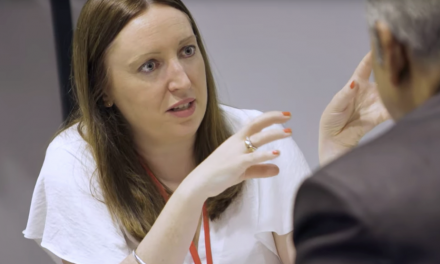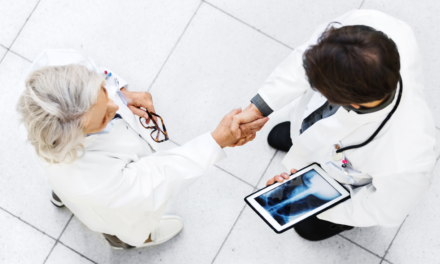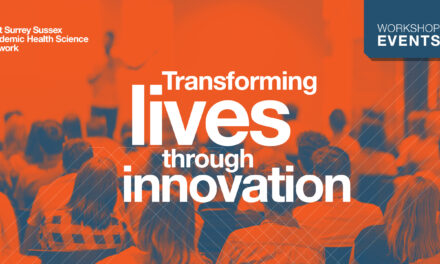Meet Dr Rachael Grimaldi, Co-Founder of CardMedic, a company which improves patient experience and safety by overcoming communication barriers between patients and clinicians.
Rachael tells us how award winning CardMedic is helping to reduce health inequalities, the moment COVID highlighted a hidden, global healthcare challenge and how to go from concept to launch in 72 hours…
Tell us about your innovation – what and why?
CardMedic is a digital app that’s designed to reduce health inequalities resulting from communication barriers in healthcare. It’s an A-Z list of pre-written scripts that replicate common clinical conversations or interactions and it’s available as a mobile app or via the website.
Staff can access the scripts and choose which one, or which series, is relevant to communicate with their patient. They can change their chosen script to different languages, sign language, videos, easy-read or read-aloud, so they can overcome any communication barrier in healthcare at the point of care.
In short, CardMedic is designed to improve patient experience and patient safety by improving communication.
What was the lightbulb moment?
When I was on maternity leave in March 2020, at the start of the pandemic, we were abroad when the borders shut and couldn’t get back to work. I read about a patient who had been in intensive care with COVID and was terrified because he couldn’t understand healthcare staff through PPE. So I thought “people must be writing notes on paper to communicate”, which they were, and that if we made those notes digital and created this A-Z library, then staff could communicate better with patients in an emergency or urgent situation.
We got feedback very quickly from staff, carers, patients and members of the public, across the UK and internationally, that this was bridging a huge gap in service provision. People in clinical practice often end up relying on friends and family to translate, or other members of staff or machine translation and COVID was exacerbating the health inequalities faced by this group of patients who make up nearly 50% of the population.
People were then asking if our solution could be used long-term after the pandemic, at which point we thought let’s see if we can make this scalable and really fill out the content for people and increase the options for languages and sign languages. I’ve had a background and a long interest in human factors, patient safety and communications in my clinical practice and so it brought the two together.
What’s been your innovator journey to date?
A crazy one! So, we started out by launching within 72 hours of concept. My husband, whose background is e-commerce, branding and communications, was able to build the website and within three weeks we had a lot of international media coverage through his background working with the Department for International Trade. This gave us a lot of feedback and we were introduced to an accelerator called TheHill at Oxford University Hospitals, as well as getting Innovate UK grants, with the support of KSS AHSN. We did MassChallenge which is a US accelerator, and we joined the NHS Clinical Entrepreneur programme.
We’ve picked up some awards along the way which is really nice. We won the US MassChallenge last year which was amazing. I also won She Loves Tech which is the world’s largest competition for women in technology. We’ve won several other awards as well, including one from the Prime Minister and most recently we won the Digital Health Re-wired Pitchfest.
We’ve had tens of thousands of people using CardMedic since we started and we’re constantly re-iterating through their feedback.
How has KSS AHSN supported you?
It’s been a variety almost from the very beginning when I first met Nuala Foley and Charlotte Roberts who helped us think about the product itself – what were we offering, making sure that we were solving an actual problem, as well as thinking about our “go to market” strategy and ensuring we had a clear vision of who our customer is.
Nuala and Charlotte helped us with the pricing strategy and the subscription model, what might work and what might not work based on their experience. They helped when we applied for the Innovate UK grant and most recently they enabled us to connect with Unity Insights and fund a piece of research with University Hospitals Sussex NHS FT on a ‘time-in-motion’ study about how much CardMedic could improve efficiency for staff by reducing the time they spend looking for translators.
Overall, they’ve supported us with a combination of business advice, strategic advice, networking and access to research.
What has been your toughest obstacle to date?
I think it’s more about challenges than obstacles. Fundraising is challenging because it’s so time consuming. We’ve had a huge amount of interest from angel investors and venture capital firms which is amazing but it does take up a huge amount of time and bandwidth.
Probably one of the biggest challenges to date has been the time it takes to procure into the NHS. If procurement was faster in the NHS it would massively streamline the process, making everybody’s lives easier in the process (so says everyone trying to sell into the NHS!).
What are your hopes for the future?
Our hopes are that we can scale quickly across the NHS because we’re solving a national, in fact international, problem. If there was a way to roll out nationally, that would be amazing. In terms of development work, we hope to integrate into electronic health records (EHRs) and really scale that way. We’ve made our first sale in the US and have some pilots underway there too; we plan to scale in the US and have a geographic roadmap after that.
A typical day for you would include?
From a personal point of view, I’ve got children to look after so my husband and I share the morning routine and getting them to nursery and school. Then the remainder of the day involves meetings, for example ranging from clinicians, Trusts and ICSs, to investors, accelerator programmes and networking. I also occasionally do podcasts, interviews and webinars, which are always fun! I also practice clinically two days a week as well.
What three bits of advice would you give budding innovators?
The first thing is to make sure that you love the problem that you’re trying to solve and don’t invent a solution that doesn’t tackle an actual problem. You’ll be spending every waking second doing it, so you’ve got to care about what you’re doing.
Another thing for me is that if, like me, you don’t have a background in business, then take the time to access the wealth of resources, accelerators, opportunities and networks available for support and advice. You won’t have the answer to everything, so try and surround yourself with people who do.
The other thing is we launched CardMedic in 72 hours – I didn’t even have time to think about it! If we had thought about it, I would have spent a lot more time planning. But I think there’s a balance; don’t spend too long planning, you need to get something out there to get you started as well. Doing market research to understand the problem and where your solution fits in is always a good start, just don’t delay too long taking the first step. Just get something out there!
——–
Find out more about CardMedic and follow them on Twitter @cardmedic
To find out about the support available from Nuala, Charlotte and our industry engagement team, please get in touch via kssahsn.bridgingthegap@nhs.net





